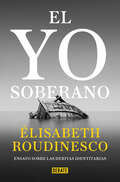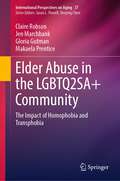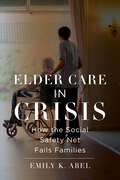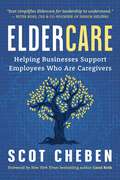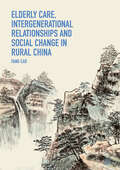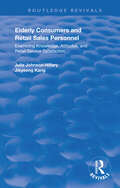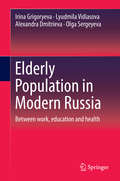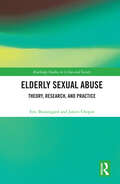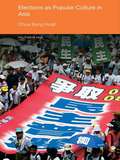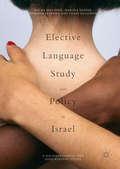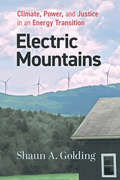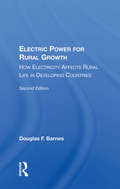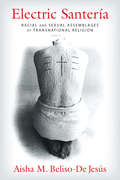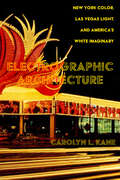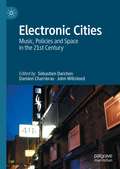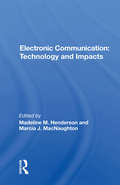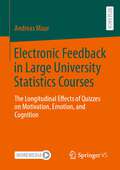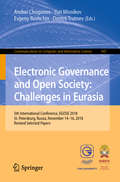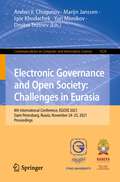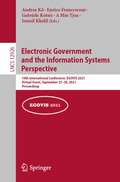- Table View
- List View
El yo soberano: Ensayo sobre las derivas identitarias
by Elisabeth RoudinescoUna reflexión valiente y audaz sobre las trampas de la política de la identidad, clave para entender el estado el mundo de hoy. El fenómeno de la «asignación de identidad» ha ido tomando fuerza en los últimos veinte años, hasta el punto de involucrar a la sociedad en su conjunto. Así lo atestiguan la evolución de la noción de género y las metamorfosis de la idea de raza. ¿Qué ha pasado para que los compromisos emancipatorios del pasado, en particular las luchas anticoloniales y feministas, hayan se hayan replegado sobre sí mismos de tal manera? El derribo de estatuas en nombre del antirracismo es desconcertante, y la violencia con la que se manifiesta el odio a los hombres en el seno de la lucha feminista plantea interrogantes. En décadas recientes, se han reinterpretado hasta el exceso instrumentos de pensamiento ricos y de gran fineza —de las obras de Sartre, Beauvoir, Lacan, Césaire, Foucault, Deleuze o Derrida— para sostener unos ideales nuevos cuya prioridad no es alcanzar una sociedad más justa. En paralelo, la noción de identidad nacional regresa en los discursos de la extrema derecha, habitados por el terror. Estos valoran lo que los identitarios del otro lado rechazan: la identidad blanca, masculina, viril, colonialista, occidental. Identidad contra identidad, por tanto. En esta reflexión valiente y audaz sobre las trampas de las políticas identitarias, clave para entender el mundo de hoy, Élisabeth Roudinesco ofrece algunas pistas para huir del laberinto de la esencialización de la diferencia y de lo universal. La crítica ha dicho:«Una investigación inspirada en la obsesión contemporánea de asignar una identidad a cada persona: un manual de progresismo pragmático».Le Monde «Una obra notablemente investigada que analiza, con talento y meticulosidad, la naturaleza y los peligros de las derivas identitarias, dondequiera que surjan. No era fácil entrelazar los hilos que unen los debates sobre la identidad, el Islam, la República, el colonialismo, etc., para dar sentido a los cambios contemporáneos en la relación con la alteridad. Como historiadora, pero con todos los recursos de las ciencias sociales, la autora consigue el tour de force de arrojar luz sobre el asunto con una coherencia que sorprenderá a la mayoría de los lectores».Nonfiction
Elastic Language
by Grace Q. ZhangElastic language carries non-specific and stretchable meaning, as in 'He loves her, kind of'. It is used like a slingshot, targeting various strategic goals. Consolidating current research and charting new directions, this book develops a refreshing theory of elasticity, empirically attested by natural language data from tension-prone encounters between Australian Customs officers and passengers. The theory proposes three principles (fluidity, stretchability and strategy) and offers a systematic look at how elastic language, as a sliding scale, works to balance strengthening and weakening speech tones, to firm and soften a speaker's stance, and to reveal and evade the truth. The comparative analysis of forms, functions, and context confirms that elastic language is fluid, stretchable, and strategic. It serves both cooperative and competitive functions, and social and speech factors impact on its use. This book will appeal to students and researchers working in pragmatics, applied linguistics, sociolinguistics, discourse analysis, and communication.
Elastizität organisieren: Formen und Funktionen von Stellvertretungen in Organisationen (Organisationssoziologie)
by Martin VogelWozu Stellvertretung in Organisationen? – diese Frage ist trivial: Schließlich ist jede/r einmal krank oder im Urlaub. Wenn dann niemand einspringen kann, kann das weitreichende Folgen haben. Wozu also noch diese Studie? – Weil die Frage trivial ist bzw. weil es interessant ist zu beobachten, wie es (in) einem gegebenen Kontext gelingt, ein Phänomen so erscheinen zu lassen, als sei es trivial. Dieser Band leistet einerseits einen Beitrag zum Verständnis von Stellvertretung in Organisationen: die Klärung des Begriffs, die Einordnung von Stellvertretung als organisationale Struktur und die Ermittlung ihrer Funktionen. Zum anderen unterstützt Martin Vogel die Forderung, systemtheoretische Forschung „empiriefähiger“ zu machen und stellt hierfür eine Forschungsheuristik zur Diskussion. Der Titel „Elastizität organisieren“ rückt ein Konzept Niklas Luhmanns ins Zentrum. Mit Hilfe ihrer Stellen können Organisationen auf sich ändernde Umweltbedingungen reagieren, indem sie Stellen neu schaffen, umwidmen, einsparen oder von Beginn an „ambivalent“ programmieren. Das Buch stellt Stellvertretungen als Beispiel dieser „Ambivalenzstrategie“ vor: Auf der Rückseite ihrer trivialen Funktion dienen sie als voraussetzungsvolle „elastische“ Lösung für vielfältige organisationale Probleme.Elastizität zu organisieren ist kein triviales Geschäft.
Elder Abuse in the LGBTQ2SA+ Community: The Impact of Homophobia and Transphobia (International Perspectives on Aging #37)
by Gloria Gutman Claire Robson Jen Marchbank Makaela PrenticeThis book describes and analyzes the lived experience of elder abuse from the queer community. It discusses the experiences by transwomen, gay men and lesbians of financial abuse, physical and sexual abuse, homophobic abuse, and neglect within partner relationships, residential care, in home care, and religious organizations. Queer and trans elders have been described as ‘The Silent Generation’, since they have lived through times when their sexual and gender identities were criminalized and pathologized. The book shows that they are far more at risk to suffer abuse and neglect by those they should be able to trust, since they are more likely to have encountered all key risk factors, such as isolation, previous abuse and trauma, and mistrust of the health care system. Their vulnerability has been overlooked and this book addresses that gap. As such, this book provides a great resource to anyone working with elders, including medical professionals, care providers, police, counsellors, and policy makers.
Elder Care in Crisis: How the Social Safety Net Fails Families (Health, Society, and Inequality #2)
by Emily K. AbelExplains why there is a crisis in caring for elderly people and how the COVID-19 pandemic exacerbated itBecause government policies are based on an ethic of family responsibility, repeated calls to support family members caring for the burgeoning elderly population have gone unanswered. Without publicly funded long-term care services, many family caregivers cannot find relief from obligations that threaten to overwhelm them. The crisis also stems from the plight of direct care workers (nursing home assistants and home health aides), most of whom are women from racially marginalized groups who receive little respect, remuneration, or job security. Drawing on an online support group for people caring for spouses and partners with dementia, Elder Care in Crisis examines the availability and quality of respite care (which provides temporary relief from the burdens of care), the long, tortuous process through which family members decide whether to move spouses and partners to institutions, and the likelihood that caregivers will engage in political action to demand greater public support. When the pandemic began, caregivers watched in horror as nursing homes turned into deathtraps and then locked their doors to visitors. Terrified by the possibility of loved ones in nursing homes contracting the disease or suffering from loneliness, some caregivers brought them home. Others endured the pain of leaving relatives with severe cognitive impairments at the hospital door and the difficulties of sheltering in place with people with dementia who could not understand safety regulations or describe their symptoms. Direct care workers were compelled to accept unsafe conditions or leave the labor force. At the same time, however, the disaster provided an impetus for change and helped activists and scholars develop a vision of a future in which care is central to social life.Elder Care in Crisis exposes the harrowing state of growing old in America, offering concrete solutions and illustrating why they are necessary.
Eldercare: Helping Businesses Support Employees Who Are Caregivers
by Scot ChebenIn today's multigenerational workforce, supporting employee caregivers isn't just compassionate-it's essential for sustainability and success.When your employees assume caregiving roles outside of the workplace, it affects staff retention and attention, and therefore, your bottom line. As more and more people live longer and with myriad health limitations, many businesses have failed to keep pace. It's imperative to put proper infrastructure in place to support caregiving employees. Eldercare: Helping Businesses Support Employees Who Are Caregivers seeks to help employers cope with the complex situations arising for those who need to care for their aging loved ones. It offers practical advice, including: Why it is important for businesses to know the facts about caregiving The financial effects for employees The rules and guidelines of the Family and Medical Leave Act (FMLA) How your business can help its employees External help and resources Safeguard employee retention and a healthy workplace culture while ensuring continued profitability by providing resources and benefits to your caregiving employees. Help them manage the overwhelm of balancing caregiving and work, and you will both thrive.
Elderly Care, Intergenerational Relationships and Social Change in Rural China
by Fang CaoThis book investigates how rapid socio-political-economic change in China since 1949 has affected intergenerational relationships and practices in rural areas, specifically the care provided to elderly parents by their adult children. It focuses on the lived experiences of rural villagers and their perceptions of the impact of these socio-political changes on intergenerational relationships, care of the elderly, family cohesion, and the traditional value of filial piety. It notably considers the importance of filial piety as a dominant family value, the conflict between strong family bonds and growing desires for individuality and autonomy, the prevalence of migrant work among adult children and the diversification of intergenerational practices, alongside the need for national policy and services development for residential and community-based aged care in rural China.
Elderly Consumers and Retail Sales Personnel: Examining Knowledge, Attitudes and Retail Service Satisfaction
by Julie Johnson-Hillery Jikyeong KangOriginally published in 1997. Based around the author's observations and experiences in the fashion retailing industry and later dissertation research, this study looks at the attitudes of retailers towards the elderly. The aim of the research presented is to challenge stereotypes, suggest practical ways in which improve service for the aging population and identify areas where retailers could improve customer service across all consumer groups as well as the older age groups.
Elderly Population in Modern Russia: Between Work, Education And Health
by Irina Grigoryeva Lyudmila Vidiasova Alexandra Dmitrieva Olga SergeyevaThis book compares the wellbeing of older Russian adults in the EU, USA, China, Japan, and Russia. Through providing a general overview of population ageing, social, economic and IT-literacy among older Russian adults, it fills the gap in quality of life research in developing and transition societies. The topic is revealed in the context of the modern elderly’s changing identity, their life plans, and intergenerational relations. The connection between ageism and sexism are identified and interpreted, thereby using comparative materials on different countries. The book discusses the issue of educating the elderly in a new direction—namely, the use of ICTs. It also presents the result of studies on pension reform discussions over social networks, which illuminate the social response to the political, social, and economic agenda. As such this book will be a valuable read to researchers specialized in aging, gender studies, quality of life studies, Russian studies, ICT adoption studies, and to those studying the social transformation of Russia, Eastern Europe, the BRICS countries, which face similar problems with aging.
Elderly Sexual Abuse: Theory, Research, and Practice (Routledge Studies in Crime and Society)
by Eric Beauregard Julien ChopinThis book offers an analytical review of the state of knowledge on elderly sexual abuse and presents new data that will confront some of the accepted ideas and some of the myths associated with this specific form of sexual violence. Sexual violence research has often considered children to be the most vulnerable population. However, another population just as vulnerable to sexual abuse but often overlooked by researchers, is the elderly. Evidence shows that elderly victims are more likely to be attacked by strangers, most likely to be victimized in their own homes, and are usually less capable of resisting a physical attack. Drawing on a large and representative dataset, Elderly Sexual Abuse offers a full and theoretically informed picture of the offenders and their crimes. In addition to a specific chapter devoted to prevention and criminal investigation, the book also connects research to practice, exploring what the findings mean for professionals working with these cases and the criminal justice system. This book is essential reading for all those engaged with sexual violence, victimization, elder abuse, and vulnerable populations.
Elections and Democratization in the Philippines (Comparative Studies in Democratization)
by Jennifer FrancoFirst published in 2001. This study shows how legitimate elections held under centralized authoritarian conditions before 1986, though not democratic, still contributed to democratization by creating the political space needed for democratic oppostion to arise.
Elections as Popular Culture in Asia (Politics in Asia)
by Chua Beng HuatConventional political science depicts legitimate elections as rational affairs in which informed voters select candidates for office according to how their coherently presented aims, ideologies and policies appeal to the self-interest of the electorate. In reality elections, whether in first world democracies, or in the various governmental systems present in Asia, can more realistically be seen as cultural events in which candidates’ campaigns are shaped, consciously or unconsciously, to appeal to the cultural understanding and practices of the electorate. The election campaign period is one in which the masses are mobilized to participate in a range of cultural activities, from flying the party colours in noisy motorcycle parades to attending political rallies for or against, or simply to be entertained by the performances on the political stage, and to gambling on the outcome of the contest. The essays in this book analyse electioneering activities in nine Asian countries in terms of popular cultural practices in each location, ranging from updated traditional cultures to mimicry and caricatures of present day television dramas. In presenting political election as an expression of popular culture this book portrays electoral behaviour as a meaningful cultural practice. As such this book will appeal to student and scholars of political science and cultural studies alike, as well as those with a more general interest in Asian studies.
Elective Language Study and Policy in Israel
by Malka Muchnik Marina Niznik Anbessa Teferra Tania GluzmanThis book presents research on the instruction of two heritage languages and two foreign languages in Israeli schools. The authors explore language policy and the way languages are studied from the point of view of students, teachers, schools and curricula. Language in Israel is a loaded concept, closely linked to ideological, political, and social issues. The profound changes in language policy in the West along with two large waves of immigration from the Former Soviet Union and Ethiopia resulted in new attitudes towards immigrant languages and cultures in Israel. Are these new attitudes strong enough to change the language policy in the future? What do students and teachers think about the language instruction at school? Are the teaching materials updated and do they address modern demands? This book provides answers to these and other questions. As well as describing the instruction of two heritage languages, Russian and Amharic, and two foreign languages, French and Spanish, the book also contains an extensive background on the immigration history and acculturation process of the speakers of each of these languages. An in-depth understanding of the case of Israel will serve as a guide for other countries contending with similar issues pertaining to the adjustment of language policies in light of immigration and other challenging circumstances.
Electoral Systems and the Balance of Consumer-Producer Power
by Eric C. C. Chang Mark Andreas Kayser Drew A. Linzer Ronald RogowskiThis book investigates the effects of electoral systems on the relative legislative and, hence, regulatory influence of competing interests in society. Building on Ronald Rogowski and Mark Andreas Kayser's extension of the classic Stigler–Peltzman model of regulation, the authors demonstrate that majoritarian electoral arrangements should empower consumers relative to producers. Employing real price levels as a proxy for consumer power, the book rigorously establishes this proposition over time, within the OECD, and across a large sample of developing countries. Majoritarian electoral arrangements depress real prices by approximately ten percent, all else equal. The authors carefully construct and test their argument and broaden it to consider the overall welfare effects of electoral system design and the incentives of actors in the choice of electoral institutions.
Electric Mountains: Climate, Power, and Justice in an Energy Transition (Nature, Society, and Culture)
by Shaun A. GoldingClimate change has shifted from future menace to current event. As eco-conscious electricity consumers, we want to do our part in weening from fossil fuels, but what are we actually a part of? Committed environmentalists in one of North America’s most progressive regions desperately wanted energy policies that address the climate crisis. For many of them, wind turbines on Northern New England’s iconic ridgelines symbolize the energy transition that they have long hoped to see. For others, however, ridgeline wind takes on a very different meaning. When weighing its costs and benefits locally and globally, some wind opponents now see the graceful structures as symbols of corrupted energy politics. This book derives from several years of research to make sense of how wind turbines have so starkly split a community of environmentalists, as well as several communities. In doing so, it casts a critical light on the roadmap for energy transition that Northern New England’s ridgeline wind projects demarcate. It outlines how ridgeline wind conforms to antiquated social structures propping up corporate energy interests, to the detriment of the swift de-carbonizing and equitable transformation that climate predictions warrant. It suggests, therefore, that the energy transition of which most of us are a part, is probably not the transition we would have designed ourselves, if we had been asked.
Electric Power For Rural Growth: How Electricity Affects Rural Life In Developing Countries
by Douglas F. BarnesThis book offers important historical information on the state of rural electrification in the 1980s. It also summarizes the development of benefit evaluation methods, along with findings from recent research on the impact of rural electrification for development.
Electric Santería: Racial and Sexual Assemblages of Transnational Religion (Gender, Theory, and Religion)
by Aisha Beliso-De JesúsSantería is an African-inspired, Cuban diaspora religion long stigmatized as witchcraft and often dismissed as superstition, yet its spirit- and possession-based practices are rapidly winning adherents across the world. Aisha M. Beliso-De Jesús introduces the term "copresence" to capture the current transnational experience of Santería, in which racialized and gendered spirits, deities, priests, and religious travelers remake local, national, and political boundaries and reconfigure notions of technology and transnationalism.Drawing on eight years of ethnographic research in Havana and Matanzas, Cuba, and in New York City, Miami, Los Angeles, and the San Francisco Bay area, Beliso-De Jesús traces the phenomenon of copresence in the lives of Santería practitioners, mapping its emergence in transnational places and historical moments and its ritual negotiation of race, imperialism, gender, sexuality, and religious travel. Santería's spirits, deities, and practitioners allow digital technologies to be used in new ways, inciting unique encounters through video and other media. Doing away with traditional perceptions of Santería as a static, localized practice or as part of a mythologized "past," this book emphasizes the religion's dynamic circulations and calls for nontranscendental understandings of religious transnationalisms.
Electrographic Architecture: New York Color, Las Vegas Light, and America's White Imaginary
by Prof. Carolyn L. KaneBridging histories of technology, media studies, and aesthetics, Electrographic Architecture forges a critical narrative of the ways in which illuminated light and color have played key roles in the formation of America's white imaginary. Carolyn L. Kane charts the rise of the country's urban advertisements, light empires, and neoclassical buildings in the early twentieth century; the midcentury construction of polychromatic electrographic spectacles; and their eclipse by informatically intense, invisible algorithms at the dawn of the new millennium. Drawing on archival research, interviews, and visual analysis, Electrographic Architecture shows how the development of America's electrographic surround runs parallel to a new paradigm of power, property, and possession.
Electronic Cities: Music, Policies and Space in the 21st Century
by Sébastien Darchen Damien Charrieras John WillsteedThis book examines Electronic Dance Music (EDM) scenes in 18 cities across Africa, the Middle East, Europe, Asia, North America and Australia. It focuses on the historical development of these scenes, with an emphasis on the post-2000 context, including the COVID-19 pandemic and its far-reaching effects. Expert contributors highlight the influence of geographical contexts, as well as cultural and political histories, in the development of mainstream EDM scenes and underground Electronic Dance Music Cultures. This expansive work offers additional insights on cultural and creative policies, planning interventions and regulations associated with nightlife management, and provides a detailed analysis of current challenges inherent to the governance of EDM scenes in contemporary cities.
Electronic Communication: Technology And Impacts
by Madeline M. Henderson Marcia J. MacNaughtonElectronic communications technology and services permeate every aspect of national life. This book examines the current and expected states of the technology and considers the societal impact and policy issues arising from new technological developments. Particular attention is paid to evaluation of computerized conferencing for enhanced communication among researchers in specialized and interdisciplinary fields and to technology assessments of criminal justice and tax administration systems.
Electronic Databases and Publishing
by Albert HendersonThe true pioneers in electronic publishing put their bibliographic databases on tape and online in the 1960s. Nearly all of them had long experience with compiling information for distribution in printed form and a strong market connection. As a result of Soviet advances in science and space technology, American government support for information science and academic libraries flowed freely for a little over a decade, making possible tremendous advances in technology, in retrieval techniques and in sophisticated coverage. Advances in information technology and market conditions have encouraged many more participants to underwrite the development of databases that now extend into the arts, social sciences, business, and popular interests. These essays show how production statistics accompanied by statements of editorial coverage provide a fairly accurate reflection of output of many of the major disciplinary bibliographic databases. The urgent priority of information resources in the 1960s has encouraged comprehensive servicing of the formal research literature as published in journals and monographs. Authors have counted subject words, languages, origins, types of publication, and so on over several decades. This volume also includes articles on some databases that are not strictly bibliographic, such as the CMG database of college courses, which illuminates some of the changes in college textbook publishing. Information seekers will find the many tables of practical use, as guidance to what and how much may be found within each database. Analysts of publishing, of science policy, and of higher education will find information relevant to expenditures, human resources, and other indicators of education, research, and technology activity.
Electronic Feedback in Large University Statistics Courses: The Longitudinal Effects of Quizzes on Motivation, Emotion, and Cognition
by Andreas MaurDigital tools and pedagogies in public higher education are unfolding their potential by providing large groups of students with automated, continuous learning and feedback opportunities. However, most of the existing studies are cross-sectional, unidirectional and focus on a limited selection of relevant target variables and instructional features. In a field study, Andreas Maur used longitudinal latent structural equation modelling with a large sample of students to analyse the interrelations between formative feedback from electronic quizzes and different facets of the control value theory of achievement emotions. The results suggest that regular quizzes most consistently improve self-efficacy, anxiety, effort, course enjoyment, and hopelessness over time. Only feedback effects related to intrinsic motivation were consistently less effective for female and less proficient students, and for students in traditional versus flipped classrooms. These findings highlight the need to scale up formative feedback in higher education and to cultivate feedback systems with higher levels of sophistication, adaptability, and gamification mechanics.
Electronic Governance and Open Society: 5th International Conference, EGOSE 2018, St. Petersburg, Russia, November 14-16, 2018, Revised Selected Papers (Communications in Computer and Information Science #947)
by Dmitrii Trutnev Evgeny Roshchin Andrei Chugunov Yuri MisnikovThis book constitutes the refereed proceedings of the 5th Conference on AElectronic Governance and Open Society: Challenges in Eurasia, EGOSE 2018, held in St. Petersburg, Russia, in November 2018. The 36 revised full papers were carefully reviewed and selected from 98 submissions. The papers are organized in topical sections on smart city infrastructure, policy; digital privacy, rights,security;data science, machine learning, algorithms, computational linguistics; digital public administration, economy, policy; digital services, values, inclusion; digital democracy, participation, security, communities, social media, activism; social media discourse analysis; digital data, policy modeling; digital government, administration, communication.
Electronic Governance and Open Society: 8th International Conference, EGOSE 2021, Saint Petersburg, Russia, November 24–25, 2021, Proceedings (Communications in Computer and Information Science #1529)
by Marijn Janssen Andrei V. Chugunov Dmitrii Trutnev Yuri Misnikov Igor KhodachekThis book constitutes the refereed proceedings of the 8th Conference on Electronic Governance and Open Society: Challenges in Eurasia, EGOSE 2021, held in St. Petersburg, Russia, in November 2021.The 21 full papers were carefully reviewed and selected from 69 submissions, additionally one invited paper has been included in this volume. The papers are organized in topical sections on digital technology and design; digital Society; digital government and economy.
Electronic Government and the Information Systems Perspective: 10th International Conference, EGOVIS 2021, Virtual Event, September 27–30, 2021, Proceedings (Lecture Notes in Computer Science #12926)
by Enrico Francesconi Ismail Khalil A Min Tjoa Gabriele Kotsis Andrea KöThis volume LNCS 12926 constitutes the papers of the 10th International Conference on Electronic Government and the Information Systems Perspective, EGOVIS 2021, held in September 2021 as part of the DEXA 2021 conference. The event was held virtually due to COVID-19 pandemic. The 13 full papers presented were carefully reviewed and selected from 21 submissions and focus on information systems and ICT aspects of e-government. The papers are organized in 3 topical sections: e-government theoretical background and cases; identity management and legal issues; artificial intelligence and machine learning in e-government context.
